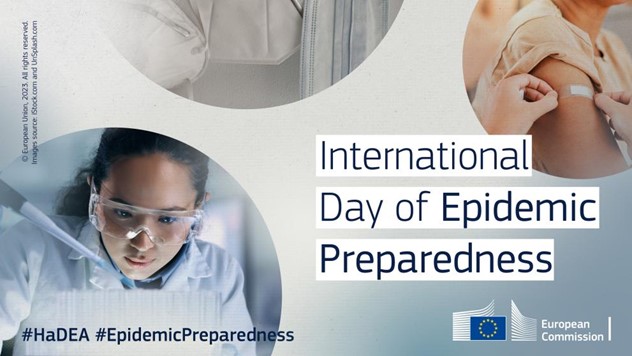The COVID-19 pandemic has shown how important it is for Europe to be better prepared for future health threats. HaDEA manages a variety of projects under the EU4Health and Horizon programmes in the field of crisis/pandemic preparedness, also on behalf of the Health Emergency Preparedness and Response Authority (HERA).
On the International Day for Epidemic Preparedness, discover how these projects are aiming to protect citizens from cross-borders health threats.
EU4Health
The UNITED4Surveillance Joint Action aims to build capacity at EU and national level for a decentralised integrated system, integrating existing and new data sources for more comprehensive infectious disease surveillance, prevention and control.
The DURABLE project is establishing the HERA laboratory network, a network of laboratories to enhance preparedness for future health emergencies, with particular emphasis on intelligence gathering to support the timely provision of medical countermeasures.
The EU-WISH Joint Action seeks to improve national public health wastewater surveillance capacities by strengthening knowledge exchange and sharing best practices based on scientific evidence.
In the field of whole genome sequencing, HaDEA is currently managing 21 grants to EU countries to enhance the capacities of national infrastructures working on genome sequencingand/or reverse transcription polymerase chain reaction (RT-PCR) to respond to the COVID-19 pandemic and future health threats.
ProCure compares public procurement practices in the health sector across different EU countries and assesses what changes were implemented as a result of the COVID-19 crisis. On this basis, it aims to outline new national and regional strategies for improved practices in public procurement.
On behalf of HERA, HaDEA has signed two contracts in the field of pandemic preparedness. The first one is the framework contract for the establishment of the EU FAB network of vaccine producers in the EU to quickly manufacture vaccines when and where needed.
The second contract aims to develop the Advanced Technology for Health INtelligence and Action IT System (ATHINA), which focuses on collecting intelligence to assess health threats before they evolve into health emergencies and identify response options.
Related to ATHINA, the EU-HIP project focuses on strengthening EU countries’ IT systems to ensure their interoperability with this IT platform for intelligence-gathering.
A contract has also been signed for a study to support the Commission in monitoring the effectiveness of EU actions against antimicrobial resistance.
Horizon Europe
- The RECODID project will build a common cloud-based platform for sharing and analysing data on infectious diseases with the international scientific community.
- The MOOD project is making use of data mining and analysis of big data to enhance the timely surveillance of public health threats.
- Pandasia is developing models to predict zoonotic spillover processes and disease emergence to prevent future pandemics.
- Escape aims to improve the efficiency and scalability of early pandemic response plans by providing evidence-based guidelines, standardised research protocols and digital solutions to avert or reduce disease and societal burden.
- PCR 4 All is researching the technical feasibility of using polymerase chain reaction (PCR) as a mass-screening method and first line of defence in fighting future pandemics.
- The CCHFVaccine project is developing a vaccine that can significantly increase the global capacity to control the Crimean Congo Haemorrhagic fever (CCHF), with a special focus on its prevention.
- ECRAID-Prime aims to establish a single point-of-access for testing novel therapeutics that speed up recovery and reduce long-term consequences of respiratory infections and complications.
- The EU-RESPONSE project focuses on setting up a multinational, adaptive European trial network for COVID-19 and emerging infectious diseases, permitting most European hospitals to participate at their preferred level of commitment.
- CORESMA is working on an mHealth surveillance system to obtain real-time clinical data and improve risk assessment in countries most likely to be heavily affected by COVID-19.
- I-MOVE-COVID-19 is developing a flexible surveillance platform for pooling European results on the COVID-19 pandemic by expanding on the existing Europe-wide influenza monitoring vaccine effectiveness (I-MOVE) network.
- The UNDINE project is researching the genetic and immunological factors that determine the consequences of SARS-CoV-2 exposure, with the objective of developing faster and better large-scale diagnosis for individuals at increased risk of critical COVID-19.
- The HERCOV project aims to analyse the role of human endogenous retroviruses (HERVs) to identify and evaluate a set of biomarkers needed for the diagnosis, prognosis and follow-up of COVID-19 patients and their prioritisation for targeted therapy.
- The COVID-19 VACCINES project will support the efforts by the Coalition for Epidemic Preparedness Innovations (CEPI) to develop vaccine programmes against COVID-19.
Background
EU4Health is the fourth and largest of the EU health programmes. The programme provides funding to national authorities, health organisations and other bodies through grants and public procurement, contributing to a healthier Europe.
HaDEA manages the vast majority of the total EU4Health budget and implements the programme by managing calls for proposals and tenders from 2021 to 2027.
Horizon Europe is the research and innovation programme of the EU for the period 2021-2027. The aims of Cluster 1 ‘Health’ include improving and protecting the health and well-being of citizens of all ages by generating new knowledge, developing innovative solutions and integrating where relevant a gender perspective to prevent, diagnose, monitor, treat and cure diseases. Horizon 2020 (H2020) was the EU’s multiannual funding programme between 2014 and 2020.
Source: European Commission | European Health and Digital Executive Agency (HaDEA) (https://shorturl.at/lpEGO)
